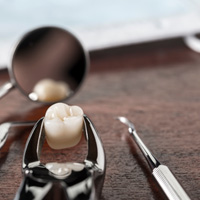
At Moreno & Young Dental, our top priority is to keep dental concerns from arising for the sake of your comfort and ongoing oral health. Wisdom tooth extractions in Bellingham allow us to not only relieve pain caused by wisdom teeth but also prevent future issues like misalignment and infection from occurring. Preventive care like this allows us to address risks of dental problems before the issue actually arises, keeping you out of the emergency dentist’s office. Call our office today to learn whether you could benefit from wisdom tooth extraction.

Wisdom teeth, also known as third molars, are the last teeth to erupt in the back of your mouth. While our paleolithic ancestors could use these to crunch on hard seeds and tough meats, we don’t have much use for them nowadays, and that has led to them causing more issues than they’re often worth. As a result, most people who have between one and four of their wisdom teeth have them removed to prevent pain, cysts, and infections.

Our team will only recommend removing wisdom teeth if they pose a threat to your future oral health or are causing you severe pain. We also recommend extraction when there isn’t enough room in your mouth to allow them to grow in, which could cause orthodontic issues, as well as increase your risk of cavities.

At Moreno & Young Dental, we always try to preserve your natural teeth whenever we’re able to. However, if we notice that your wisdom teeth will pose threats to your oral health, it’s likely that we’ll recommend extracting them. While our team refers our patients who have impacted wisdom teeth to local experts, we do extract third molars that have erupted through the gumline in-house. This process is similar to any other type of extraction. We’ll elevate the tooth out of its socket and gently wiggle it back and forth, which will allow us to fully remove it from your mouth.

After your wisdom tooth extraction in Bellingham, we advise you to follow these aftercare instructions to make a speedy recovery:

Nothing adds more stress to a bad wisdom tooth situation than worrying about the cost. At Moreno & Young Dental, we completely understand, and we’re committed to providing clear, upfront pricing and exploring your options. Whether your case is simple or complex, we’ll walk you through every detail before treatment begins so you can focus more on your smile and less on the paperwork. Read more below to see how we can help you fit wisdom tooth extraction into your budget.

Because every smile is unique and every patient’s situation is different, the cost of wisdom tooth extractions isn’t one-size-fits-all. In fact, several factors can influence the price, including:
Before your procedure, we’ll give your mouth a thorough examination and review all your options, including what’s covered by insurance and what may be out-of-pocket. We believe in full transparency so you can feel confident moving forward with your care.

Yes, most dental insurance plans will help cover wisdom tooth extractions, especially when the procedure is medically necessary. However, it’s always best to confirm the information in your plan, as providers can vary in the type and level of coverage.
Our Bellingham dental practice is in-network with Delta Dental Premier. Even if we’re not on your specific plan, we’re happy to work with your provider to help you maximize your benefits. Our front desk team will help you understand what your plan covers before treatment begins.

We believe finances shouldn’t stand in the way of care. That’s why we offer flexible payment options at Moreno & Young Dental, including:
Our team will help you find the option that works best for your budget, so you can focus on healing and not the bill. Still have questions or concerns? Just give us a call or schedule a consultation with our team, and we'll walk you through the process.
Let’s start with one of the most-asked questions: Does it hurt? If you’ve been wondering the answer as well, you don’t have to worry – your mouth will be numbed with a local anesthetic beforehand. Not only that, but our Bellingham dental team will provide you with helpful aftercare instructions to help you stay comfortable during the healing period.
According to an article published in the Dental Research Journal, between 5% and 37% of people are missing at least one of their wisdom teeth. Although there are several theories as to why some patients never develop a third set of molars, genetics is the prevailing one. In other words, if your parents or grandparents didn’t have all of their wisdom teeth, there’s a chance you might not either!
If your procedure is still a few days or weeks away, you may be wondering if there is anything you can do to alleviate your discomfort in the meantime. The short answer is “yes.” First, place a cold compress (or towel-wrapped icepack) against the outside of your cheek for 10 minutes at a time. It’s also a good idea to avoid doing anything that could exacerbate your symptoms, like eating crunchy foods. Finally, if nothing else seems to be working, you can take OTC pain medication. Just make sure to follow the directions on the label.
If you aren’t in pain, but your wisdom teeth increase your risk of infections, cysts, and other problems, then the answer is “yes.” Ultimately, if you’re having doubts about whether or not the procedure is really necessary, the best thing to do is talk to our team! We’d be happy to provide you with further insight and answer any questions you have so you feel completely confident moving forward.
You need to wait until you’ve regained full sensation in your mouth, which usually takes about two hours. Waiting this long will also ensure the gauze pads stay in place, slowing down the bleeding in the process. Once you are in the clear to eat, stick to extremely soft foods, like seedless fruit smoothies (don’t use a straw!), applesauce, and plain yogurt. As you heal, you’ll be able to incorporate more substantial foods into your diet.
Tip: Always check the temperature of your food before you eat it! Remember, the extraction site and the area around it will be considerably more sensitive than usual.
Preparing for a good night’s sleep starts earlier than you may suspect: at dinner. Instead of eating crunchy, spicy, or acidic foods, stick to soft, bland foods, like vegetable broth. Then, use a cold compress in 10-minute intervals to alleviate inflammation and provide a temporary numbing sensation. Taking prescribed or OTC pain medication as directed and keeping your head elevated will help immensely as well!